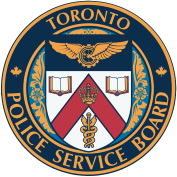
XXXIX LE-012 – Search of Persons
|
REPORTING REQUIREMENT |
Annual Report |
|
LEGISLATION |
Police Services Act, R.S.O. 1990, c.P.15, as amended, Adequacy & Effectiveness of Police Services, O. Reg. 3/99, s. 13(1)(h). |
The Toronto Police Services Board (the Board) is committed to the principle that every person has a right to receive police services in accordance with relevant legislation and Board policy, in a manner which respects their dignity and human rights.
In particular, where searches of persons are concerned, it is important that all searches are conducted in accordance with all legal and constitutional requirements, including those set out in the case of R. v. Golden, as well as the relevant provisions of the Canadian Charter of Rights and Freedoms, the Police Services Act and the Ontario Human Rights Code.
Therefore, it is the policy of the Toronto Police Services Board that:
- The Chief of Police will establish procedures and processes regarding search of persons that address:
- the compliance by members of the police service with legal and constitutional requirements relating to when and how searches of persons are to be undertaken;
- the circumstances in which an officer may undertake a search of a person;
- protective searches;
- frisk searches
- strip searches;
- body cavity searches;
- consent searches;
- the supervision of searches of persons; and
- the documentation of searches of persons.
- The Chief of Police will ensure that officers and other members as appropriate are kept informed of changes in the law relating to the search of persons.
With respect to strip searches and body-cavity searches, in particular, it is the policy of the Toronto Police Services Board that:
- The Chief of Police will establish procedures that accord with all legal and constitutional requirements, including the judgment of the Supreme Court of Canada in R. v. Golden, and that ensure that such searches are not conducted simply as a matter of routine.
- The Chief of Police will establish procedures that ensure that each time a strip search or a body-cavity search is conducted, the individual being searched is informed of the reason for the search and the justification for conducting the search is recorded.
- The Chief of Police will report to the Board on an annual basis with respect to:
- the total number of strip searches and body-cavity searches conducted by members of the Toronto Police Service;
- in general terms, the reasons articulated as the basis for the strip searches;
- the number of searches (protective, frisk, and strip) conducted in the field;
- the number of times that the Metal Detector Wand was used; and
- the number of times an item of concern (weapon, evidence, any item that could potentially cause harm to the individual or others, drugs, etc.) was found as a result of the search; and
- The Chief of Police will notify the Board in the event of any substantive change to the relevant procedures.
adequacy standards, law enforcement, interaction with public